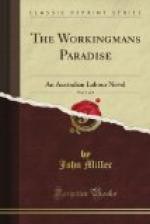The women, the poor women, they were most wretched of all; the poor housewives in their pathetic shabbiness, their faces drawn with child-bearing, their features shrunken with the struggling toil that never ceases nor stays; the young girls in their sallow youth that was not youth, with their hollow mirth and their empty faces, and their sharp angles or their unnatural busts; the wizened children that served at the stalls, precocious in infancy, with the wisdom of the Jew and the impudence of the witless babe; the old crones that crawled along—the mothers of a nation haggling for pennies as if they had haggled all their lives long. They bore baskets, most of the girls and housewives and crones; with some were husbands, who sometimes carried the basket but not always; some even carried children in their arms, unable even for an hour to escape the poor housewife’s old-man-of-the-seas.
The men were absorbed, hidden away, in the flood of wearied women. There were men, of course, in the crowd, among the stallkeepers—hundreds. And when one noticed them they were wearied also, or sharp like ferrets; oppressed, overborne, or cunning, with the cunning of those who must be cunning to live; imbruted often with the brutishness of apathy, consciousless of the dignity of manhood, only dully patient or viciously keen as the ox is or the hawk. Many sottish-looking, or if not sottish with the beery texture of those whose only recreation is to be bestially merry at the drink-shop. This was the impression in which the few who strode with the free air of the ideal Australian workman were lost, as the few comfortable—seeming women were lost in the general weariness of their weary sex.
Jollity there was none to speak of. There was an eager huckling for bargains, or a stolid calculation of values, or a loud commendation of wares, or an oppressive indifference. Where was the “fair” to which of old the people swarmed, glad-hearted? Where was even the relaxed caution of the shopping-day? Where was the gay chaffering, the boisterous bandying of wit? Gone, all gone, and nothing left but care and sadness and a careful counting of hard-grudged silver and pence.
Ned turned his head once or twice to steal a glance at Nellie. He could not tell what she thought. Her face gave no sign of her feeling. Only it came home to him that there were none like her there, at least none like her to him. She was sad with a stern sadness, as she had been all day, and in that stern sadness of hers was a dignity, a majesty, that he had not appreciated until now, when she jostled without rudeness in this jostling crowd. This dark background of submissive yielding, of hopeless patience, threw into full light the unbending resolution carved in every line of her passionate face and lithesome figure. Yet he noticed now on her forehead two faint wrinkles showing, and in the corners of her mouth an overhanging fold; and this he saw as if reflected in a thousand ill-made mirrors around, distorted and exaggerated and grotesqued indeed but nevertheless the self-same marks of constant pain and struggle.




